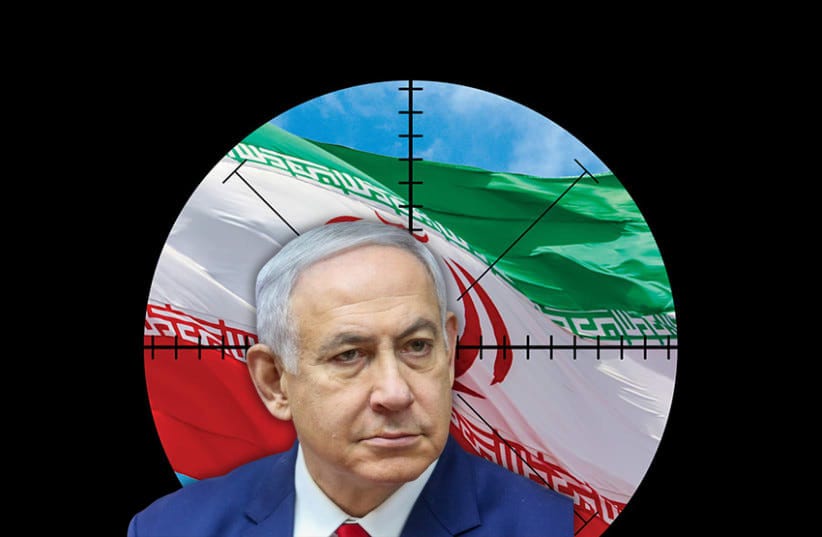
Credit: Jerusalem Post
by James M Dorsey
In some respects, Israel and Iran have traded places when it comes to Lebanon.
Iran sees a ceasefire as a way to shield Hezbollah, the Shiite Muslim militia, against US and Israeli efforts to degrade the group not only militarily but also politically and secure continued Iranian support for the militia..
That is what Israeli Prime Minister Binyamin Netanyahu believes he can prevent by continuing to wage war.
It is unclear whether Hezbollah knew that the prime minister would not be in Caesaria at the time of the attack.
The prime minister based his claim on long-standing Israeli assertions that Hezbollah is Iranian-controlled rather than Iranian-backed.
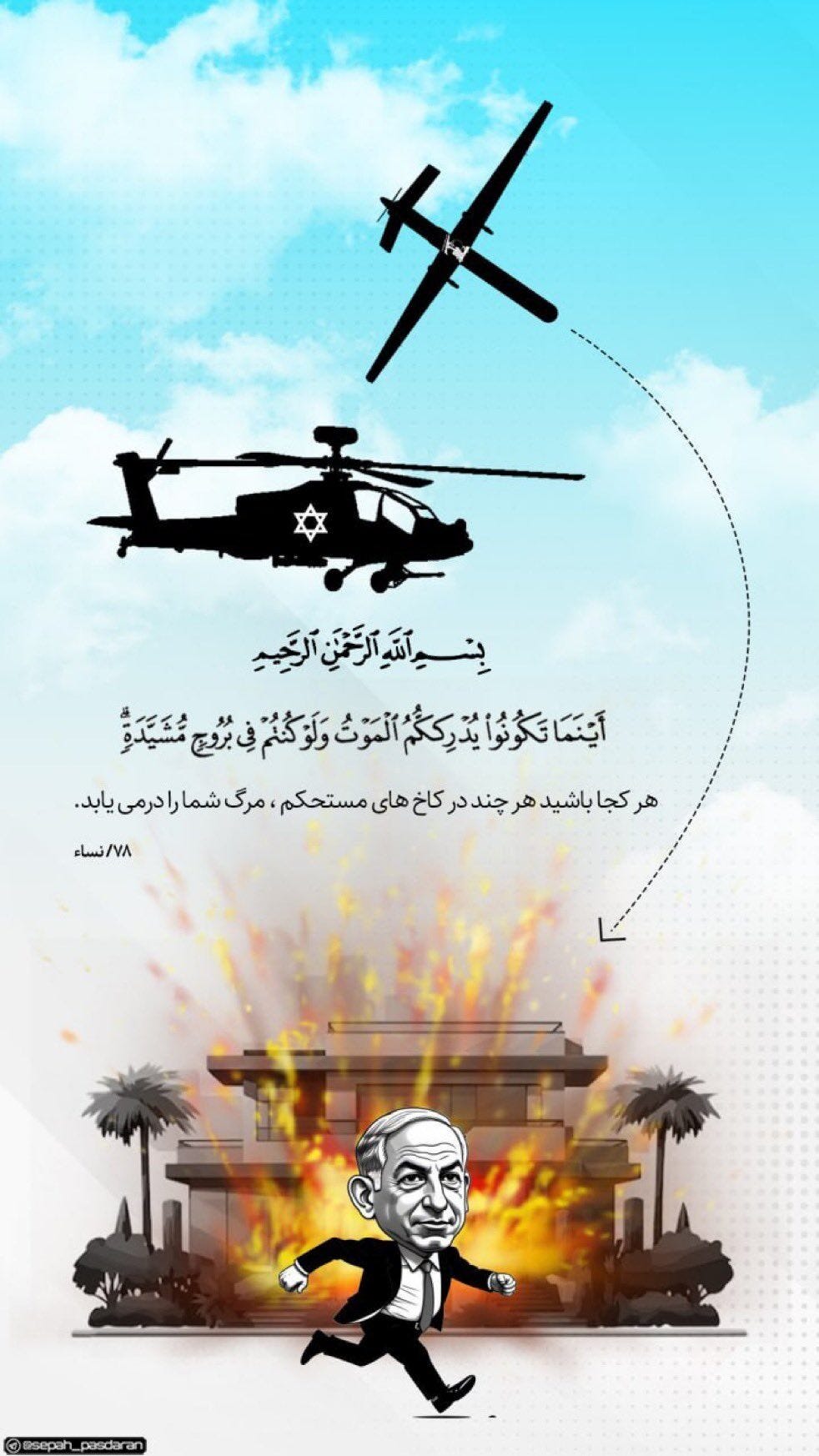
Islamic Revolutionary Guard Corps-linked group celebrates the targeting of Binyamin Netanyahu’s Caesaria residence. Source: Instagram
By linking Iran to an alleged assassination attempt, Mr. Netanyahu raised the stakes and kept his options open on the targeting and severity of Israel’s anticipated retaliation for Iran’s October 1 missile attack on Tel Aviv.
Mr. Netanyahu may also have wanted to exploit recently-elected Iranian President Masoud Pezeshkian’s failure to build the bridges to the West needed to reopen nuclear negotiations and secure sanctions relief.
Speaking in Oman, a past US-Iranian back channel, Iranian Foreign Minister Abbas Araghchi said efforts to revive the talks were on hold in the absence of a ceasefire in Gaza and Lebanon.
“As long as we cannot overcome the current crisis, we do not see a basis for these discussions, and we must decide whether to resume negotiations or not,” Mr. Araghchi said.
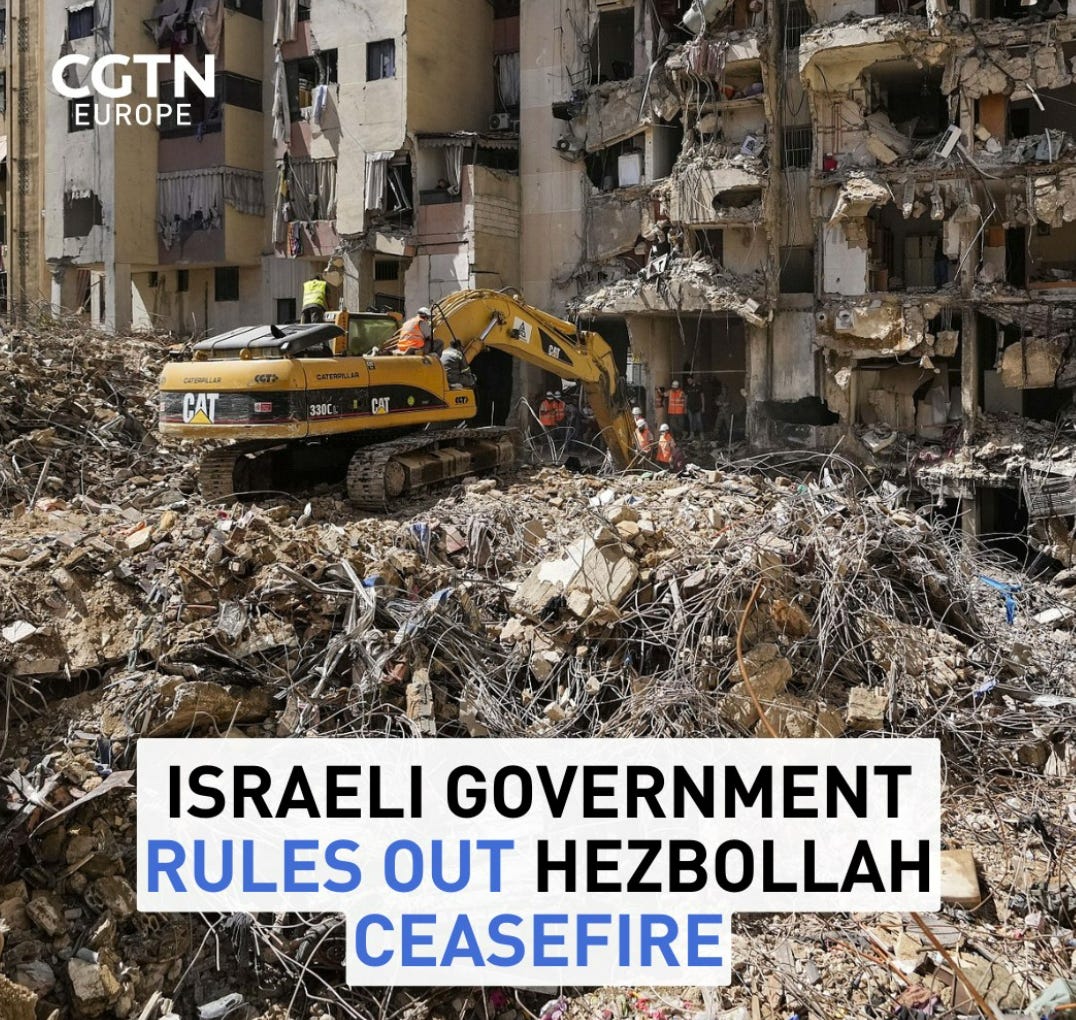
Mr. Netanyahu’s assertion of an attempt on his life may also have been informed by Israeli intelligence reports that Iranian military officers are seeking to help Hezbollah fill the vacuum created by Israel’s killing of scores of the group’s top and middle-rank commanders.
Veteran Israeli Middle East analyst Ehud Ya’ari suggested that Iran was seeking to steer Hezbollah towards a ceasefire rather than escalation of the conflict and ensure it doesn’t lose its domestic political clout in Lebanon.
In a twist of irony, more than a year into the war, Hezbollah finds itself in a situation like that of Hamas in Gaza.
Many in Lebanon accuse Hezbollah of provoking Israel’s attack by unilaterally initiating hostilities across the Lebanese-Israeli border in support of the Palestinians, a day after last year’s October 7 Hamas attack on Israel that sparked the Gaza war.
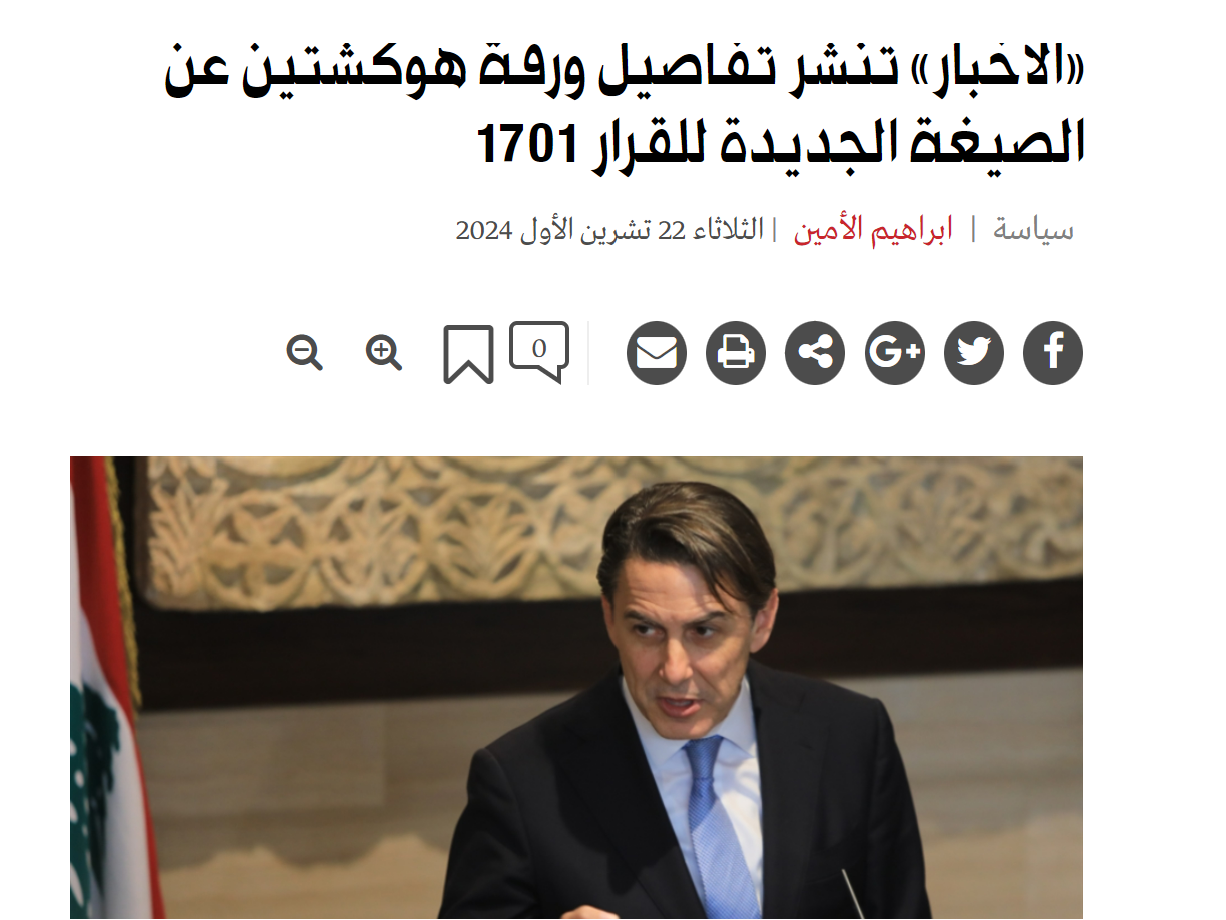
Al-Akhbar reports Israeli demands conveyed by US envoy Adam Hochstein. Credit: The Turbulent World
Even so, Al-Akhbar, a Lebanese newspaper close to Hezbollah, reported the group had rejected a US ceasefire proposal that incorporated Israeli demands for changes in United Nations Security Council resolution 1701.
Iran is likely to have backed Hezbollah’s rejection of an amendment of 1701 that would accommodate the Israeli demands.
Hezbollah insists on the implementation of the resolution as adopted to end the 2006 Lebanese war and create the United Nations Interim Force in Lebanon (UNIFIL), the UN peacekeeping force in southern Lebanon.
Israel demanded the resolution be amended to extend the peacekeeping force’s geographic mandate beyond the Litani River, 30 kilometres north of Lebanon’s border with Israel.
Israel also wants the Security Council to expand UNIFIL’s policing powers in southern Lebanon and to include Lebanese ports, airports, and border crossings with Syria.
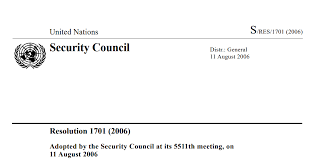
Hezbollah and Iran fear that the United States, Europe, and Gulf states will link the implementation of resolution 1701 and support for the reconstruction of war-ravaged areas of Lebanon to Security Council resolution 1559 adopted in 2004.
They are also concerned donors will make aid conditional on reducing Hezbollah’s grip on Lebanese politics.
Resolution 1559 called for the disarmament of non-state militias and the withdrawal of foreign forces.
Even so, Iran’s effort to shield Hezbollah appears half-hearted. Iran has been careful not to be seen as joining the Lebanese fray despite its financial, technological, and military support of the group.
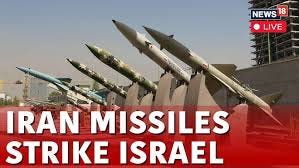
Iran carefully calibrated its October 1 missile attack on Tel Aviv to avoid provoking an all-out war with Israel.
The attacks were meant to keep up appearances after Israel’s July 31 assassination in Tehran of Hamas political leader Ismail Haniyeh and the September 27 killing in Beirut of Islamic Revolutionary Guard General Abbas Nilforoushan and Hezbollah leader Hassan Nasrallah.
In a twist of irony, Hezbollah, like Hamas, is discovering the limits to solidarity in the Iranian-backed Axis of Resistance that brings together the two groups, Syria, Yemen’s Houthi rebels and Iraqi Shiite militias.
Iran eulogised the recently assassinated Hamas leader Yahya Sinwar but put the burden of revenging his death on the Axis’ non-state members.
Meanwhile, M. Araghchi, the Iranian foreign minister, included Jordan and Egypt, two US allies with long-standing peace treaties with Israel, in his tour of regional countries designed to garner support in anticipation of an Israeli retaliatory strike against Iranian targets while publicly maintaining support for the Axis.
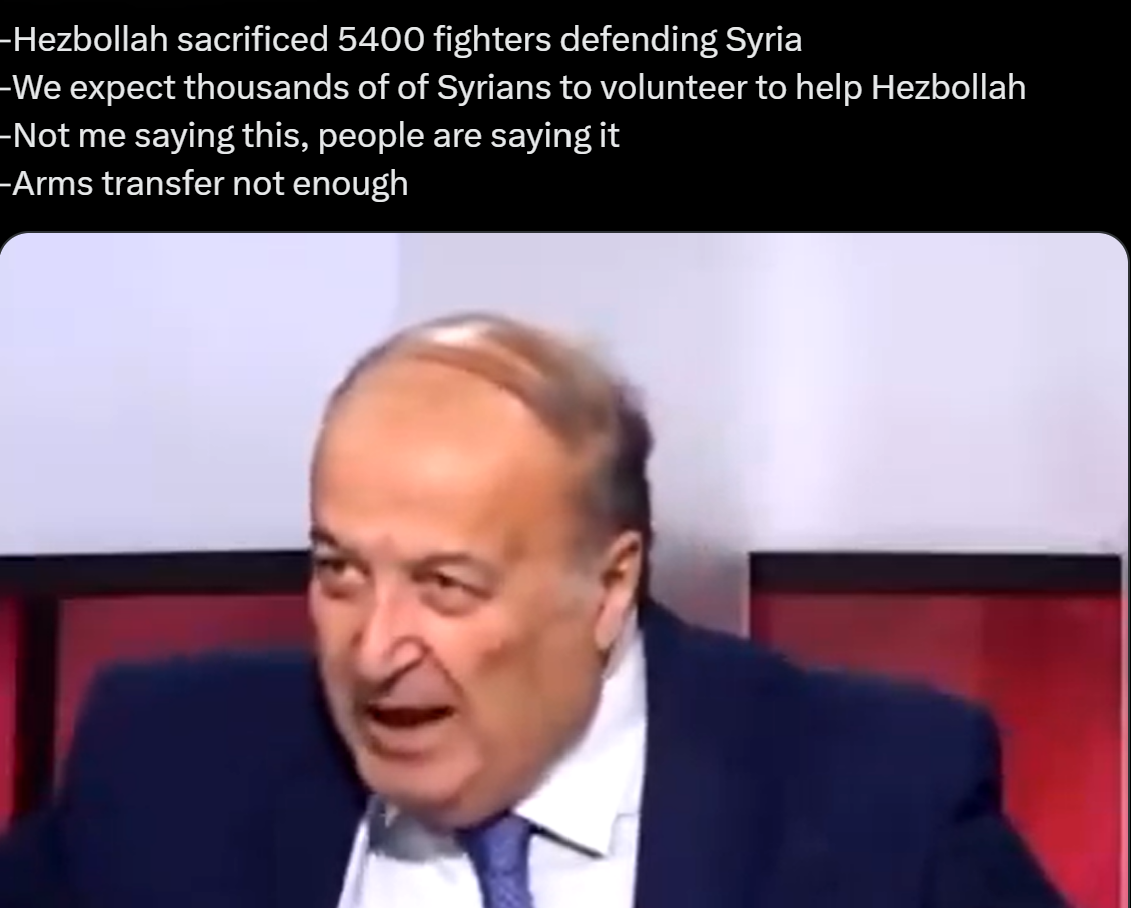
Credit: @hxhassan on Twitter
“Hezbollah sacrificed 5,400 fighters defending Syria. We expect thousands of Syrians to volunteer to help Hezbollah. Arms transfers are not enough,” said a prominent pro-Hezbollah Lebanese media figure, lamenting Syria’s lack of gratitude.
So far, Syrian President Bashar al-Assad has been missing in action.
Mr. Ya’ari, the Middle East analyst, reported that Maher al-Assad, the president’s brother and commander of the Syrian Army’s core 4th Armoured Division, instructed his troops to refuse to transfer arms to Lebanon or give shelter to Hezbollah associates.
The strains in Hezbollah-Syria relations were apparent in August when Mr. Nasrallah, the late Hezbollah leader, refused to emerge from hiding to meet with Mr. Al- Assad’s visiting intelligence chief, General Hussam Louka. Mr. Louka had to make do with Mr. Nasrallah’s deputies.
Mr. Al-Assad fears that support for Hezbollah could jeopardise his efforts to improve relations with Gulf states, even if that puts his relationship with Iran at risk.
Saudi Arabia, the United Arab Emirates, and Iran supported anti-government rebels during Syria’s decade-long civil war to counter Iranian backing for Mr. Al-Assad’s regime.
Mr. Al-Assad’s refusal to be drawn into escalating hostilities in Lebanon was likely bolstered by US strengthening of the Syrian Defense Forces’ air defense capability by arming the anti-Assad rebels with its Avenger Defense System.
A Syrian withdrawal from the Axis, whether formal or informal, would constitute a significant setback for Iran and Hezbollah and put at risk the flow through Syria of Iranian military and other supplies to the group.
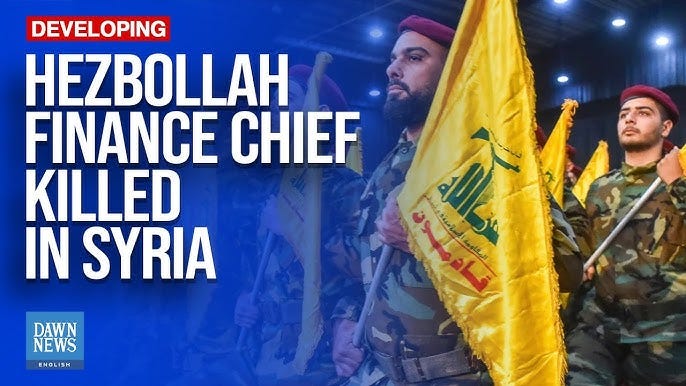
Iranian exile media quoted an Israeli intelligence source as claiming that Israel’s assassination of senior political and military leaders and attacks on the group’s infrastructure has already disrupted Iran’s monthly transfer of US$50 million to Hezbollah, a substantial part of which was moved through Syria.
The Israeli military said in early October it had killed Muhammad Ja’far Qassir, the commander of Hezbollah’s Unit 4400, and his successor. The military said the unit manages the transfer of Iranian funds and weapons to the group.
Earlier this week, Israel targeted branches of the Al-Qard Al-Hassan Association (AQAH), a pillar of Hezbollah’s social services network. Al-Qard Al-Hassan provided financial services to residents in parts of Lebanon where Hezbollah has broad public support.
Al-Qard al-Hassan had more than 30 branches across Lebanon before the Israeli strikes and many of them were located on the ground floor of residential buildings.
Israel and the United States, which designated Al-Qard Al-Hassan as a terrorist organisation, accused the group of funding Hezbollah’s military operations.
Like Hamas, Hezbollah had hoped for greater Axis support in its escalating confrontation with Israel.
Instead, rather than confronting Israel as a unified front in support of Palestine, “Hezbollah is no longer fighting for Gaza – it is fighting for its very existence,” with Israel backed by Arab regimes, the United States, and European nations, Mr. Yaari, the Middle East analyst, said.
Dr. James M. Dorsey is an Adjunct Senior Fellow at Nanyang Technological University’s S. Rajaratnam School of International Studies, and the author of the syndicated column and podcast, The Turbulent World with James M. Dorsey.
